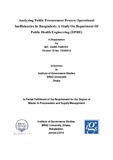Analyzing public procurement process operational inefficiencies in Bangladesh: a study on Department Of Public Health Engineering (DPHE)

View/Open
Date
2016-01Publisher
BRAC UniversityAuthor
Parvez, Md. ZahidMetadata
Show full item recordAbstract
Government is implementing e-GP to improve transparency and efficiency in Public Procurement. As a Government Organization, Department of Public Health Engineering (DPHE) is using e-GP in procurement activity to ensure transparency and accountability of using public fund. It is a great responsibility for the Executive Engineers to ensure utilization of public funds properly. Failure in Procurement process operation may increase cost and time and slow down development of Bangladesh. In DPHE, Executive Engineers act as Procurement Entities and Assistant Engineers & Sub-assistant Engineers participate in evaluation and tender opening process as members. Most of the Sub-Assistant Engineers have lacked computer literacy and not all Assistant and Sub-Assistant Engineers have computer and internet facility. Evaluating the inefficiencies in procurement process operation will help to identify the knowledge gaps and will help to mitigate the issues identified. Qualitative Research was conducted to address the research questions. The study was limited on the Executive Engineers of Department of Public Health Engineering (DPHE) due to time constrain. After analyzing the interviewed documents it was found that all respondents talked about Server Incapability, Unplanned Training, and troublesome BOQ uploading process as Procurement Process Operation inefficiency. Other inefficiencies were Supplier Selection failure due to Corrupted File Upload, Lengthy Document Verification, lack of knowledge, lack of logistics Support and reinventing the wheel for two tenders having same documenting. Generally causes behind these inefficiencies were uncertain server downtime, unplanned training, lack of training database, lack of motivation, lack of computer literacy, lack of computer availability and internet facility, absence of conversion software, lengthy manual evaluation. The consequences of these inefficiencies were lengthy procurement cycle, extra workload on Procuring Entities, tender opening failure leading to extra added step like time extension approval in procurement cycle, lack of confidence, Lack of reliability of work , slowness of procurement activity, typing error, extra step of corrigendum for correcting typing error, lack of competition and litigation issue, prolonged tender preparation time, violation of code of ethics, risk of erroneous and biased evaluation and litigation problem and added extra cost and time in tender preparation. The mitigation of these inefficiencies include controlling number of tenders to be floated in e-GP system each year, upgrading server, planned training, proper motivation and use of reward power, developing a cloud document verification and storage system, implementing Central Technical Support Service at DPHE and ensuring computer and internet facilities.
